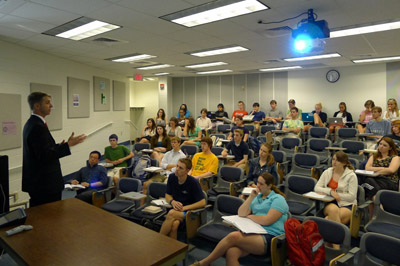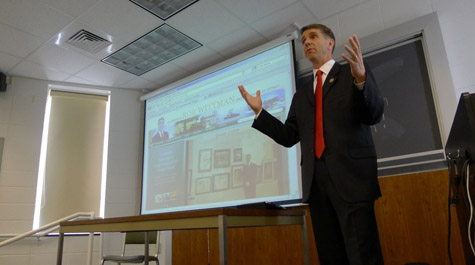Congressman Wittman discusses D.C. politics, redistricting and the Bay
The William & Mary community was treated Tuesday to an insider’s look into politics of the nation’s capital. Congressman Rob Wittman (R-Va.) was on campus to meet with students and faculty and give a public lecture as the College’s 2011 Hunter Andrews Fellow.
The recently averted federal government shutdown, energy policies, redistricting and the role the William & Mary’s Virginia Institute of Marine Science can play in governing and evaluating Chesapeake Bay recovery were among the topics discussed in Wittman’s hour-long talk in Blow Memorial Hall.
“To me, the Chesapeake Bay is an economic engine,” said Wittman, who serves a member of the Committee on Natural Resources. He said the Chesapeake Bay creates jobs through the seafood industry and tourism opportunities such as fishing and recreation.
“A more productive Bay creates more jobs and more of an economic impact in Virginia,” Wittman said, adding as part of the Bay’s recovery efforts, it was important to “identify every penny that goes into the Bay and hold everyone accountable.”
As a member of the Committee on Natural Resources, Wittman has introduced legislation aimed at increasing the accountability and effectiveness of cleaning up the Chesapeake Bay, and he has been a staunch supporter of the College’s Virginia Institute of Marine Science.
“I think we are blessed here in Virginia to have the Virginia Institute of Marine Science. I think they would be perfectly situated to serve in that role as independent evaluator. It is a great opportunity for VIMS, and VIMS is a big piece of William & Mary.”
The Hunter B. Andrews Fellowship was created in 1998 by friends of the former state senator and William & Mary alumnus who died in 2005. The fellowship program brings notable journalists, politicians, and scholars to campus each year. Several of the previous fellows have been recently deceased Washington Post columnist David Broder; U.S. Congressman and civil rights leader John Lewis; and the New York Times’ former Supreme Court reporter Linda Greenhouse, who was the 2010 fellow.
Wittman, who represents Virginia’s 1st Congressional District, was first elected in December 2007. His re-election in November 2010 continued a long public career spent serving in a variety of government positions at every level, from Montross Town Council to United States Congress.
He holds a Ph.D. in public policy and administration from Virginia Commonwealth University, a Master of Public Health degree in health policy and administration from the University of North Carolina, and a Bachelor of Science degree in biology from Virginia Tech.
 During his
time on campus, the congressman spent the morning meeting with faculty and
students, including giving a talk to about 50 students taking an introductory
marine science course. The undergraduate course is part of a recently launched
minor in marine science and is taught on the main campus by VIMS professors
Mark Patterson and Kam Tang.
During his
time on campus, the congressman spent the morning meeting with faculty and
students, including giving a talk to about 50 students taking an introductory
marine science course. The undergraduate course is part of a recently launched
minor in marine science and is taught on the main campus by VIMS professors
Mark Patterson and Kam Tang.
Samantha Tiver ’11, an economics major, said the Congressman’s visit helped students apply their coursework to relevant policy.
“He explained his current proposal to increase scientific research and management of the Chesapeake Bay in order to make sure funds are ‘efficiently distributed,’” Tiver said. “As an interdisciplinary course, students come from a variety of majors and backgrounds. I truly enjoyed watching students integrate marine science and their primary discipline to challenge Congressman Wittman and engage in quality discourse.”
During his public lecture at Blow Hall, Wittman said it’s been an interesting few weeks in Washington, D.C. Earlier this month, the federal government avoided work stoppage when lawmakers agreed to a last-hour deal on cuts in the budget.
“I think all folks, both sides of the aisle, decided it was better to make sure our government continued to operate,” said Wittman, adding that it was important to reach an agreement to make sure members of the military continued to be paid. After weeks of negotiations on budget cuts, the deal cut about $38 billion in federal spending and avoided the first federal shutdown since 1995.
“The bottom line is we got a deal done,” Wittman said. “We made sure the men and women in uniform continued being paid. We are glad that Congress showed it could do the job.”
Responding to a question about redistricting, Wittman noted it will be an issue for the Virginia General Assembly to decide but that he favored keeping Williamsburg, James City and the rest of the Historic Triangle within one congressional district. To reflect new census numbers, the General Assembly must realign the boundaries of all state legislative as well as congressional districts every 10 years. As part of the process, Wittman said, the assembly is given discretion in preserving “communities of compelling interest.”
“There is no more compelling community of interest than Williamsburg, Jamestown and Yorktown,” Wittman said.
















